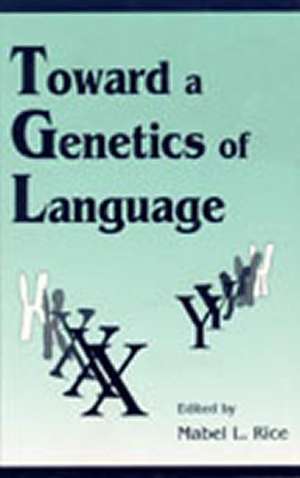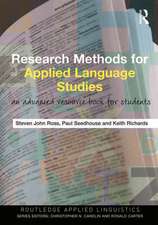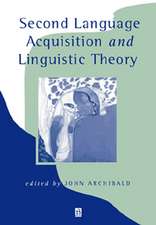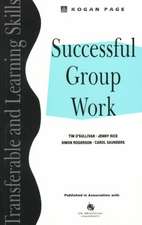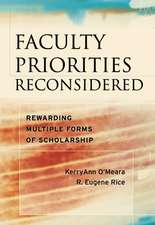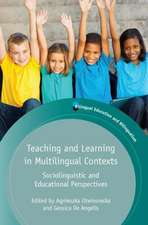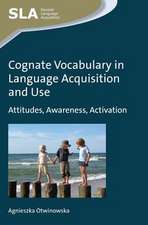Toward A Genetics of Language
Editat de Mabel L. Riceen Limba Engleză Paperback – iul 1996
Leading experts in genetics, linguistics, language acquisition, language impairment, and brain imaging are brought together for the purpose of exploring the current evidence, theoretical issues, and research challenges in a way that bridges disciplinary boundaries and points toward future developments in the search for the genetic and environmental bases of language acquisition and impairments. This collection provides discussions and summaries of:
*breakthrough findings of the genetic underpinnings of dyslexia;
*theoretical and empirical developments in the specification of a phenotype of language acquisition and impairment;
*evidence of familiarity and twin concordances of specific language impairment; and
*new evidence from brain imaging.
It concludes with a critical response from an advocate of rational empiricism.
| Toate formatele și edițiile | Preț | Express |
|---|---|---|
| Paperback (1) | 336.62 lei 6-8 săpt. | |
| Taylor & Francis – iul 1996 | 336.62 lei 6-8 săpt. | |
| Hardback (1) | 685.02 lei 6-8 săpt. | |
| Taylor & Francis – iul 1996 | 685.02 lei 6-8 săpt. |
Preț: 336.62 lei
Nou
Puncte Express: 505
Preț estimativ în valută:
64.42€ • 67.01$ • 53.18£
64.42€ • 67.01$ • 53.18£
Carte tipărită la comandă
Livrare economică 15-29 aprilie
Preluare comenzi: 021 569.72.76
Specificații
ISBN-13: 9780805816785
ISBN-10: 080581678X
Pagini: 432
Ilustrații: Illustrations
Dimensiuni: 152 x 229 x 23 mm
Greutate: 0.61 kg
Ediția:1
Editura: Taylor & Francis
Colecția Psychology Press
Locul publicării:Oxford, United Kingdom
ISBN-10: 080581678X
Pagini: 432
Ilustrații: Illustrations
Dimensiuni: 152 x 229 x 23 mm
Greutate: 0.61 kg
Ediția:1
Editura: Taylor & Francis
Colecția Psychology Press
Locul publicării:Oxford, United Kingdom
Public țintă
ProfessionalCuprins
Contents: Preface. Acknowledgments. Part I: Genetics. L. Brzustowicz, Looking for Language Genes: Lessons From Complex Language Studies. J.F. Miller, Commentary on Chapter 1. S.D. Smith, B.F. Pennington, J.C. DeFries, Linkage Analysis With Complex Behavioral Traits. J.B. Tomblin, Commentary on Chapter 2. D.L. Lefly, B.F. Pennington, Longitudinal Study of Children at High Family Risk for Dyslexia: The First Two Years. J.W. Gilger, How Can Behavioral Genetic Research Help Us Understand Language Development and Disorders? Part II: Linguistics and Language Acquisition. K. Wexler, Development of Inflection in a Biologically Based Theory of Language Acquisition. J. de Villiers, Defining the Open and Closed Program for Acquisition: The Case of Wh-Questions. C.E. Snow, Commentary on Chapter 6. Part III: Language Impairments. J.B. Tomblin, Genetic and Environmental Contributions to the Risk for Specific Language Impairment. S.D. Smith, Commentary on Chapter 7. M.L. Rice, K. Wexler, A Phenotype of Specific Language Impairment: Extended Optional Infinitives. J.W. Gilger, Commentary on Chapter 8. L.B. Leonard, Characterizing Specific Language Impairment: A Crosslinguistic Perspective. E. Plante, Commentary on Chapter 9. M.B. Crago, S.E.M. Allen, Building the Case for Impairment in Linguistic Representation. D. Poeppel, Commentary on Chapter 10. J.F. Miller, The Search for the Phenotype of Disordered Language Performance. Part IV: Brain Science. E. Plante, Phenotypic Variability in Brain-Behavior Studies of Specific Language Impairment. L.B. Leonard, Commentary on Chapter 12. D. Poeppel, What Genetics Can and Cannot Learn from PET Studies of Phonology. M. Crago, Commentary on Chapter 13. Part V: Interactionist Account of Language Acquisition. C.E. Snow, Toward a Rational Empiricism: Why Interactionism Is Not Behaviorism Any More Than Biology Is Genetics. J. de Villiers, Commentary on Chapter 14.
Recenzii
"This book brings together leading researchers from molecular biology, neuroanatomy, linguistics, cognitive science, and psychology to discuss how far we have come in our search for the genes that underlie our unique linguistic capacity. As we draw close to the end of the decade of the brain, this book presents in one place much of the most significant research on language that has been done in this century. With the publication of the volume, Mabel Rice has provided an integrated, informed perspective on this research at exactly the right time. The exciting findings that are reported throughout the book confirm how close we are to breaking the ultimate genetic code. They will surely stimulate further research over the next few years that may allow us to realize the end of our search for how human genes encode our capacity for language. This is a wonderful book that deserves a prominent position on the bookshelves of all researchers who are interested in the most exciting questions of our time."
—Helen Tager-Flusberg
University of Massachusetts, Boston
"This important and exciting book offers the beginnings of a framework within which behavioral scientists and geneticists may work together to address contributions of heredity and environment to the acquisition of language. Crucial genetics concepts are presented in a manner accessible to language researchers. Together, the chapters provide a balanced view of both the contributions genetic research may be expected to make to our understanding of language impairments and the contributions more specified definitions of language impairment may make to our understanding of human genetics."
—Carolyn B. Mervis
Emory University
—Helen Tager-Flusberg
University of Massachusetts, Boston
"This important and exciting book offers the beginnings of a framework within which behavioral scientists and geneticists may work together to address contributions of heredity and environment to the acquisition of language. Crucial genetics concepts are presented in a manner accessible to language researchers. Together, the chapters provide a balanced view of both the contributions genetic research may be expected to make to our understanding of language impairments and the contributions more specified definitions of language impairment may make to our understanding of human genetics."
—Carolyn B. Mervis
Emory University
Descriere
The past decade has brought important new advances in the fields of genetics, behavioral genetics, linguistics, language acquisition, studies of language impairment, and brain imaging. Although these advances are each highly relevant to the determination of what a child is innately prepared to bring to language acquisition, the contributing fields of endeavor have traditionally been relatively self-contained, with little cross communication. This volume was developed with the belief that there is considerable value to be gained in the creation of a shared platform for a dialogue across the disciplines.
